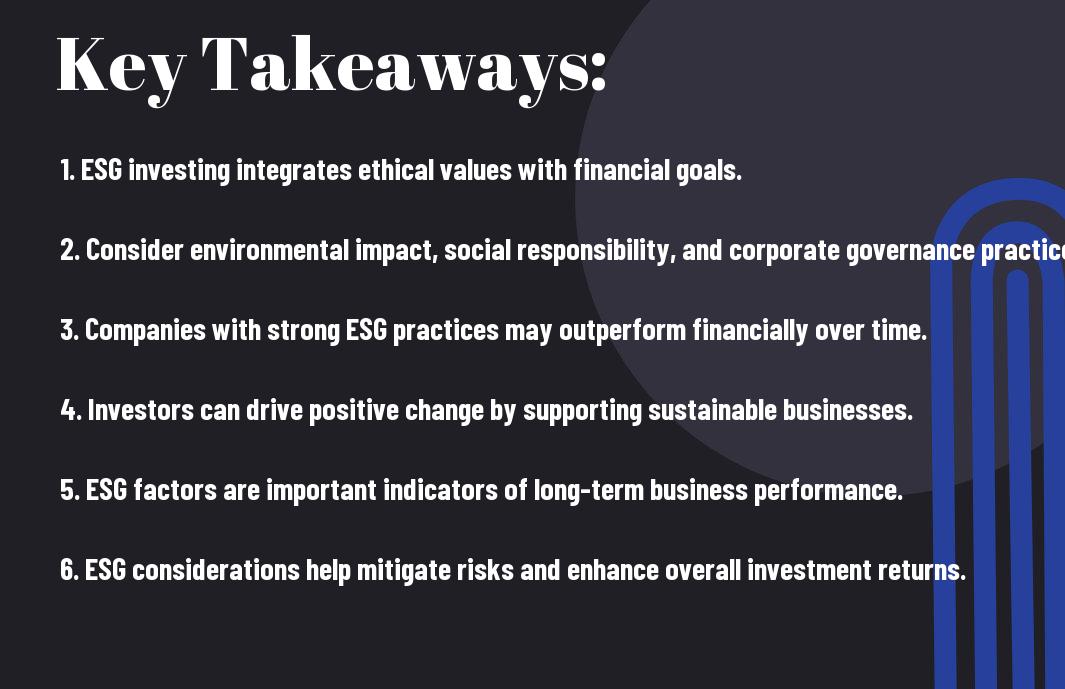Many investors today are recognizing the importance of aligning financial goals with ethical considerations, leading to the rise of ESG investing. ESG stands for Environmental, Social, and Governance, and it represents a set of criteria that socially-conscious investors consider when making investment decisions. This approach goes beyond traditional financial metrics and assesses a company’s impact on the environment, society, and corporate governance practices.
Key Takeaways:
- ESG Integration: ESG investing involves considering environmental, social, and governance factors alongside traditional financial metrics to make informed investment decisions.
- Long-Term Value: Companies with strong ESG practices are believed to be more sustainable and resilient, potentially leading to long-term financial performance.
- Risk Mitigation: ESG analysis can help identify risks related to climate change, diversity and inclusion, and corporate governance, allowing investors to mitigate these risks in their portfolios.
- Impact Investing: ESG investing allows investors to align their financial goals with their ethical considerations, supporting companies that prioritize sustainability, social responsibility, and ethical business practices.
- Transparency and Reporting: Companies are increasingly disclosing their ESG performance, providing investors with more data to evaluate and integrate ESG factors into their investment decisions.

The Environmental Component
One important aspect of ESG investing is the environmental component, which focuses on factors such as climate change, carbon footprint, resource scarcity, and biodiversity.
Climate Change and Carbon Footprint
Footprint. Climate change is a pressing issue that is directly linked to human activities and has far-reaching implications for the global economy. Investors are increasingly factoring in companies’ carbon footprint and efforts to mitigate climate change when making investment decisions. By investing in companies with sustainable practices and low carbon emissions, investors can contribute to a more environmentally responsible and resilient economy.
Resource Scarcity and Biodiversity
An imperative consideration in the environmental component of ESG investing is resource scarcity and biodiversity. As natural resources become increasingly limited and species face extinction, investors are looking at companies’ efforts to conserve resources and protect biodiversity. Companies that prioritize sustainable practices, efficient resource management, and conservation of biodiversity are seen as more attractive investment opportunities for those focusing on ESG criteria.
Another
Environmental Risk Assessment in Investments
Investments. Environmental risk assessment plays a crucial role in ESG investing, as investors evaluate the potential risks associated with environmental factors on their investments. This includes assessing the impacts of environmental regulations, natural disasters, and other environmental risks on a company’s financial performance. By incorporating environmental risk assessments into investment decisions, investors can better manage risks and capitalize on opportunities that align with their ESG goals.
Biodiversity
Overall, integrating environmental considerations into investment decisions is not only beneficial for the planet but also for investors in the long run. Companies that prioritize environmental sustainability are perceived as more resilient and better positioned to adapt to the changing business landscape, making them potentially more profitable investments. By understanding and integrating environmental factors into their investment strategies, investors can align financial goals with ethical considerations and contribute to a more sustainable future.
The Social Component
Human Rights and Labor Practices
Practices related to human rights and labor standards are crucial considerations in ESG investing. Not only do these factors impact the overall well-being of individuals, but they also have significant implications for business sustainability and long-term success. According to a study, companies with strong human rights and labor practices tend to demonstrate better financial performance and lower operational risks.
Community Impact and Social Justice
Socially responsible investing also focuses on the impact companies have on the communities in which they operate. Companies that prioritize social justice issues and community welfare are often more resilient in the face of economic downturns and regulatory challenges. By actively engaging with local stakeholders and addressing social disparities, businesses can build trust and enhance their reputation in the market.
Understanding the social impact of investments can lead to more informed decisions and ultimately drive positive change in society. Investors can support companies that promote diversity, equity, and inclusion, contributing to a more equitable and sustainable future for all.
Consumer Protection and Privacy Issues
Safeguarding consumer rights and protecting privacy are becoming increasingly important factors in ESG investing. Socially responsible companies understand the value of maintaining strong relationships with customers and prioritizing data protection. Studies show that companies with robust consumer protection and privacy policies are better positioned to mitigate reputational risks and attract loyal customers.
Human rights considerations and labor practices are integral components of ESG investing, reflecting a commitment to ethical business conduct and respect for human dignity. By aligning financial goals with ethical considerations, investors can not only achieve financial returns but also contribute to a more sustainable and inclusive global economy.

The Governance Component
Corporate Governance and Ethical Management
Many investors recognize the importance of strong corporate governance practices in ensuring the long-term sustainability and success of a company. This includes transparent decision-making processes, accountability mechanisms, and ethical behavior at all levels of the organization. By integrating environmental, social, and governance factors into their investment criteria, investors can promote companies that prioritize ethical management practices.
Anti-corruption and Transparency
With an increasing focus on anti-corruption efforts and transparency in corporate operations, investors are seeking companies that demonstrate a commitment to ethical behavior and accountability. By incorporating anti-corruption measures and promoting transparency, companies can enhance their reputation and attract socially responsible investors who value ethical practices.
Management
Board Diversity and Structure
Board diversity and structure play a critical role in ensuring effective governance and decision-making within a company. Research has shown that diverse boards are more likely to generate innovative ideas, improve financial performance, and enhance overall corporate governance. Investors are increasingly looking for companies with diverse boards that reflect a wide range of perspectives and experiences.
Understanding
By focusing on governance factors such as ethical management practices, anti-corruption measures, and board diversity, investors can align their financial goals with ethical considerations. Companies that prioritize these governance principles are not only better positioned to mitigate risks and drive long-term value creation but also contribute to a more sustainable and responsible global economy.
ESG Investment Strategies
Positive and Negative Screening
After conducting thorough research on ESG factors, investors can implement positive and negative screening strategies to align their investment choices with their ethical beliefs. Positive screening involves selecting companies that excel in ESG performance indicators, such as renewable energy usage or diversity in the workforce. On the other hand, negative screening excludes companies involved in controversial activities like fossil fuel production or child labor.
Thematic Investing
One popular ESG investment strategy is thematic investing, where investors focus on specific ESG-related themes such as clean energy, gender equality, or sustainable agriculture. This approach allows investors to target industries or sectors that align with their values and can potentially deliver strong financial returns. The thematic approach provides diversification benefits while also making a positive impact on society and the environment.
The thematic investing strategy is gaining traction in the ESG investment space, with more investors looking to allocate capital towards addressing global challenges such as climate change and social inequality. By targeting specific themes, investors can support companies and projects that are leading the way in sustainability and responsible business practices.
Impact Investing
Screening companies based on their environmental, social, and governance practices is a key aspect of impact investing. This strategy goes beyond traditional financial metrics to evaluate the real-world impact of investments on society and the environment. Impact investors seek out opportunities to generate positive outcomes, such as reducing carbon emissions or improving community health, while still aiming for competitive financial returns.
Thematic investing within the impact investing framework allows investors to support innovative solutions to pressing global challenges while also driving positive change within their investment portfolios. By incorporating impact investing strategies, investors can align their financial goals with their ethical considerations and contribute to a more sustainable future.
Shareholder Engagement and Activism
Plus, Shareholder engagement and activism are vital tools for ESG investors to influence corporate behavior and drive positive change. By actively engaging with companies on ESG issues, investors can advocate for improvements in areas such as climate change mitigation, diversity and inclusion, and transparency in governance practices. Shareholder activism involves using voting rights and shareholder resolutions to push for corporate accountability and sustainability initiatives.
Investing in companies that prioritize ESG factors not only benefits the environment and society but also has the potential to deliver long-term financial rewards. By embracing ESG investment strategies, investors can align their financial goals with their ethical beliefs and contribute to a more sustainable and socially responsible investment landscape.
Measuring ESG Performance
To assess the ESG performance of companies, it is crucial to look at a range of factors, as highlighted in a study on their impacts on corporate sustainability performance. Companies are often rated based on metrics related to their environmental impact, social practices, and governance structures.
ESG Rating and Reporting
One of the key ways in which ESG performance is measured is through the use of ESG rating and reporting frameworks. These frameworks help investors and other stakeholders understand how well a company is integrating ESG factors into its operations and decision-making processes. By providing standardized metrics and benchmarks, ESG rating and reporting enable investors to make more informed decisions that align with their ethical values.
The Role of Third-Party ESG Rating Agencies
On the forefront of assessing ESG performance are third-party ESG rating agencies. These agencies play a crucial role in evaluating and scoring companies based on their ESG practices. By utilizing their expertise and methodologies, investors gain access to comprehensive ESG data and analysis, allowing them to assess the sustainability performance of companies in a systematic and reliable manner.
Third-party ESG rating agencies offer an independent and objective perspective on ESG performance, helping investors navigate the complex landscape of sustainability reporting and disclosures. By aggregating data from various sources and applying rigorous analytical frameworks, these agencies provide valuable insights that guide investors in making socially responsible investment decisions.
Challenges in ESG Data and Standardization
Reporting and standardizing ESG data pose challenges due to the lack of uniformity and consistency in measurement practices across industries and regions. The absence of clear guidelines and benchmarks can lead to discrepancies in ESG ratings and reports, making it difficult for investors to compare the sustainability performance of different companies accurately.
To address these challenges, stakeholders in the ESG space are advocating for increased transparency, standardization, and harmonization of ESG reporting frameworks. By working towards common standards and best practices, the ESG investing community aims to enhance the reliability and credibility of ESG data, ultimately driving more informed and sustainable investment decisions.

ESG Investing and Financial Performance
Correlation Between ESG and Financial Returns
On the surface, one might wonder how investing in companies that prioritize environmental, social, and governance factors can actually lead to strong financial returns. However, numerous studies have shown a positive correlation between ESG practices and financial performance. For example, a report by Harvard Business Review found that companies with high ESG scores tend to have lower costs of debt and equity, suggesting that investors perceive them as less risky.
ESG as a Measure of Long-term Value Creation
Financial analysts and investors are increasingly recognizing the importance of ESG factors as indicators of long-term value creation. Companies that prioritize ESG considerations are better equipped to anticipate and adapt to market shifts, regulatory changes, and societal expectations. By focusing on sustainable practices and responsible governance, these companies are more likely to secure their long-term profitability and growth.
Understanding the impact of ESG factors on financial performance requires a holistic view of the investment landscape. While short-term gains may fluctuate, the overall trend shows that integrating ESG principles into investment decisions can lead to better risk-adjusted returns and more resilient portfolios.
Managing Risk Through ESG Integration
Financial institutions are increasingly integrating ESG factors into their risk management practices to mitigate potential financial risks. By analyzing ESG data alongside traditional financial metrics, investors can identify and address emerging risks related to climate change, social inequality, and corporate governance issues. This proactive approach helps in reducing volatility and enhancing the long-term stability of investment portfolios.
For instance, companies with strong ESG practices are better positioned to weather crises, as they are more likely to have robust governance structures, ethical business practices, and sustainable operational models in place. By incorporating ESG considerations into investment strategies, investors can not only align their financial goals with ethical considerations but also potentially achieve superior long-term financial performance.
The Future of ESG Investing
Regulatory Trends and Developments
An increasing number of regulators are recognizing the importance of ESG factors in investing decisions, shaping regulatory frameworks to align with sustainable practices. Environmental-, social-, and governance-related factors for sustainable investing are being emphasized as key considerations by governing bodies around the world. This shift towards regulatory support is expected to lead to greater integration of ESG factors into investment strategies, promoting a more ethical and sustainable approach to financial decisions.
Technological Advances in ESG Data Analysis
Data analytics is playing an increasingly crucial role in ESG investing, enabling investors to access and analyze vast amounts of ESG data to make informed decisions. Advancements in technology have made it easier to quantify and evaluate non-financial metrics, providing deeper insights into companies’ sustainability performance. With the growing availability of ESG data and sophisticated analysis tools, investors can better assess the risks and opportunities associated with ESG factors, ultimately driving more informed investment strategies.
ESG in Emerging Markets
Markets in emerging economies are increasingly recognizing the significance of ESG factors in driving sustainable growth and attracting investment. Companies operating in these markets are realizing the importance of incorporating ESG considerations into their business practices to enhance long-term value creation. As ESG awareness grows in emerging markets, investors are focusing on opportunities that align with sustainability goals, leading to a shift towards more responsible investing practices in these regions.
Overcoming Challenges in ESG Investing
Fiduciary Duty and ESG Consideration
All investors have a fiduciary duty to act in the best interests of their clients or beneficiaries. The integration of Environmental, Social, and Governance (ESG) factors into investment decisions can sometimes be seen as conflicting with this duty. However, research has shown that considering ESG factors can actually lead to better long-term financial performance, ultimately fulfilling the fiduciary duty of maximizing returns for investors.
Greenwashing and How to Avoid It
One of the key challenges in ESG investing is the phenomenon of greenwashing, where companies present a false impression of their environmental or social responsibility efforts. Investors must be diligent in their research and analysis to avoid falling for misleading greenwashing tactics. By conducting thorough due diligence and engaging with companies on their ESG practices, investors can steer clear of greenwashing and ensure their investments align with their ethical considerations.
Greenwashing can undermine the credibility of ESG investing and erode trust in the market. Investors must remain vigilant and discerning when evaluating companies’ ESG claims, looking beyond surface-level disclosures to assess the genuine impact of their sustainability initiatives. By holding companies accountable for their ESG performance and demanding transparency, investors play a crucial role in driving meaningful change and promoting sustainable practices in the corporate world.
Investor Education and Awareness
Education and awareness are crucial components of successful ESG investing. Many investors may lack the necessary knowledge or understanding of ESG factors and how they can impact investment outcomes. By providing resources, training, and guidance on ESG investing principles, investors can make informed decisions that align their financial goals with their ethical considerations. Increased awareness of the benefits of ESG integration can also encourage more widespread adoption of sustainable investment practices, leading to a more sustainable and responsible financial ecosystem.

Final Words
With this in mind, it is clear that ESG investing is not just a passing trend but a fundamental shift in how we approach our financial goals. By considering not only the financial performance of companies but also their impact on the environment, society, and governance practices, investors can align their investments with their values and contribute to a more sustainable and responsible future. ESG investing not only benefits the planet and the community but also has the potential to generate attractive returns for investors in the long run.
As we continue to navigate a world faced with climate change, social inequality, and corporate governance issues, ESG investing provides a practical way to make a difference while also pursuing financial success. By incorporating ESG factors into investment decisions, individuals and institutions can not only drive positive change in the world but also build a more resilient and profitable portfolio. By integrating environmental, social, and governance considerations into investment strategies, we can create a more sustainable and ethical financial system for generations to come.




